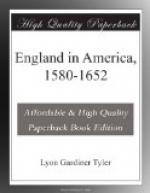About this time Bradford made a great change in the industrial system of the colony. At Plymouth, as at Jamestown, communism was found to breed “confusion and discontent,” and he tried the experiment of assigning to every family, in proportion to its size, a tract of land. In July, 1623, arrived sixty other settlers, and the old planters feared another period of starvation. Nevertheless, when harvest-time arrived, the wisdom of Bradford’s appeal to private interest was demonstrated, for instead of misery and scarcity there was joyfulness, and “plentie of corn.” Later experience was equally convincing, for, as Bradford wrote many years after, “any general wante or famine hath not been known amongst them since to this day.”
While the Pilgrim fathers were overcoming their difficulties in Massachusetts, the Council for New England were struggling with the London Company to maintain the monopoly of fishing and fur trading on the North Atlantic coast granted to them by their charter. The London Company complained to the king in 1620 and to Parliament in 1621, but the king refused any relief, and prevented Parliament from interfering by dissolving it.[6] Thereupon, the Council for New England, appreciating the danger, made a grand effort to accomplish something in America. As a preliminary step they induced the king to publish a proclamation, November 6, 1622, against all unlicensed trading and other infringements upon the rights granted them,[7] and shortly afterwards sent out Francis West as admiral to reduce the fishermen on the coast to obedience. West came to America, but found them “stuberne fellows,"[8] and he returned in about a year to England without effecting anything.
During his absence the Council for New England set to work to send out a colony under Robert Gorges, son of Sir Ferdinando; and, June 29, 1623, a division was made among twenty patentees, of the North Atlantic coast from the Bay of Fundy to Narragansett Bay.[9] In September, 1623, Gorges arrived at Plymouth attended by an Episcopal minister, William Morell, and a company of settlers, whom he planted at Wessagusset. He remained in New England throughout the winter, and in the effort to exert his authority had a long wrangle with Weston. In the spring of 1624 he received news from his father that discouraged his further stay. It seems that in March, 1624, a committee of Parliament, at the head of which was Sir Edward Coke, had reported the charter of the Council for New England as a national grievance, which so discouraged the patentees that most of them abandoned the enterprise, and it became, in the language of the elder Gorges, “a carcass in a manner breathless."[10] After Robert Gorges’ departure most of his party dispersed, some going to England and some to Virginia, but a few remained at Wessagusset, which was never entirely abandoned.




